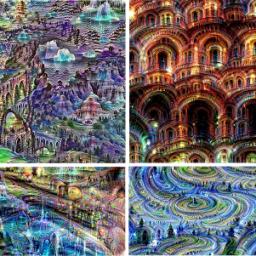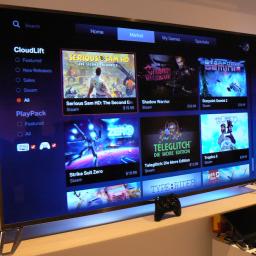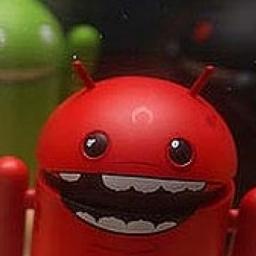
Artificial neural networks have spurred remarkable recent progress in image classification and speech recognition. But even though these are very useful tools based on well-known mathematical methods, we actually understand surprisingly little of why certain models work and others don't. How do you check that the network has correctly learned the right features? One way to visualize what goes on is to turn the network upside down. Neural networks that were trained to discriminate between different kinds of images have quite a bit of the information needed to generate images too. It can help to visualize the network's representation. in some cases, this reveals that the neural net isn't quite looking for the thing we thought it was.
If we choose higher-level layers, complex features or even whole objects tend to emerge. We call this technique "Inceptionism". If a cloud looks a little bit like a bird,
the network will make it look more like a bird. After several passes, a highly detailed bird appears, seemingly out of nowhere. Of course, we can do more than cloud watching with this technique. For example, horizon lines tend to get filled with towers and pagodas. Rocks and trees turn into buildings. Birds and insects appear in images of leaves. We can even start this process from a random-noise image, so that the result becomes purely the result of the neural network. These computer 'dreams' generated are a fascinating insight into the mind of a machine.
Google's project hosting service, Google Code, is the
latest Google product to get the axe. Launched in 2006, the site hosted many FLOSS-type software projects and provided free downloads, source code management, an issue tracker, and wiki pages. Although new project creation is already disabled, the site will stay functional until August 2015 in order to give projects time to migrate to alternatives, such as
GitHub and GitLab.
With so many high-profile Google services inexplicably closing, one has to wonder if relying on the continued availability of any Google services is a good idea. Of course, closures are not always exclusive to Google.
Gitorious and
Freecode are recent examples of other project development sites that have recently shut their doors.

Google's premium Chromebook Pixel, launched over 2 years ago, has finally been
updated with new hardware internals. Although the new model looks nearly identical to the old model, with both models sharing the same physical size and weight, the insides have received a much needed refresh with a
much faster processor and more memory. The port configuration is also updated to include 2 of the new USB Type-C connectors instead of the Mini Display Port and the power connector. An "LS" model (for "Ludicrous Speed") will also be available with even more RAM, SSD, and CPU performance.
For those wanting to run more than just a browser on your shiny new i7 with 16 GiB memory, remember you can still install a traditional Linux distro by activating the
Developer Mode toggle. Or you can keep Chrome OS as the base and run Linux from a chroot with
Crouton.
For today's
Safer Internet Day Google is promoting a "safer and more responsible use of online technology and mobile phones" by
giving you a 2 GB Google Drive bonus for checking your security settings. To be eligible for the bonus,
go to this page to verify your current account settings to make sure they are up to date. Although the three simple steps only take a few seconds to review, the storage bonus, unfortunately, does not get applied until around February 28th.
Whether or not you actually use their cloud storage service is still up to you (I'm currently using 0 GB of 115 GB) - but keeping an eye on your Google account logins (including any connected Android or iOS devices) is probably a good idea regardless.
On Monday, Google sought permission from the Federal Communications Commission to conduct tests of "proprietary wireless applications" in a section of the electromagnetic spectrum
that experts say could serve as a perfect replacement for fiber. Google declined to comment on its application for experimental radio service licenses for the 5.8 GHz, 24 GHz, 72 GHz and 82 GHz bands. In correspondence with the FCC, Google went so far as to request confidential treatment.
This is spurring speculation that Google may be looking to wireless alternatives for gigabit speed internet access in future
Google Fiber cities. This could allow them to run fiber to the block, and use wireless distribution for the last-mile. Potentially, a cheaper alternative to costly fiber roll-outs to individual homes.
High frequency spectrum is "not an unreasonable way to think about replacing fiber to the home," McFarland said. "However you'd need a clear line of sight. You could have something on a telephone pole on the street, and you could point it at an antenna on top of your house. As long as you had no obstructions, you could get multiple gigabits per second."

Philips has beaten the competition to market with the first batch of
Android-based televisions. Philips and kind are all hoping to sell you a television to which you have no need to attach any other devices, but that's no guarantee.
Previous Philips TVs lagged behind the competition in terms of streaming services, but that won't be an issue with the Android sets. You should be able to download all your favourite on demand and catch up services directly from the Google Play store, including BBC iPlayer, 4OD, Demand 5 and Netflix. 4K streaming content is supported, as the Android TVs all have HEVC codec support.
With access to Google Play, there are other possibilities too. One enterprising journalist installed a torrent downloader, found a 4K film trailer online and downloaded it to the TV, without having to jump on a computer or transfer the file from another device first.
Spotify Connect and OnLive Gaming are also on board the Philips 4K package. How the market reacts to this latest round of "innovation" will determine the future for more than one gadget-maker out there.
After many years of experimentation, Google has finally decided to
abandon its tracking of authorship. Authorship was potentially useful but a bit of a hassle to implement. First you had to create a Google profile, then somewhere, like in the footer of your blog or equivalent, you needed a hyperlink to that profile. Thirdly, in your Google profile, you had to provide a list of sites where you were an author. When you'd jumped through those hoops, you'd be rewarded with a little picture of yourself next to Google search results linked to your site.
About a year ago, they decided to reduce the number of results that showed an image to only the biggest guns or some, select searches. And now they've decided it wasn't providing much value at all, and have ditched it. From John Mueller's G+ post:
Unfortunately, we've also observed that this information isn't as useful to our users as we'd hoped, and can even distract from those results. With this in mind, we've made the difficult decision to stop showing authorship in search results.
(If you're curious -- in our tests, removing authorship generally does not seem to reduce traffic to sites. Nor does it increase clicks on ads. We make these kinds of changes to improve our users' experience.)
Sayonara, authorship! Webmasters had fun jumping through the endless hoops of clawing ourselves up the slope of Search Engine Optimization anyway!

Like it or hate it,
Google's Streetview map interface exists and is used every day by all sorts of people. Getting to the point of a usable map interface wasn't easy.
Here are some war stories from the trenches by Iain McClatchie, who participated in the effort.
We didn't know it at the time, but the problems we were having were essentially due to the high resolution we were trying to shoot. High resolution from a moving platform leads to short exposure times. Short exposure times require large relative apertures to get enough sensitivity. Compared to small format cameras, our focal lengths were fairly long (28 mm, IIRC), so that meant much larger apertures, much larger photocurrents, and thus the problems we were fighting. In hindsight, the two real solutions were lower resolution or CMOS sensors. Rather than try those, I tried to make the high resolution CCD work with shutters (the R3 camera) and choppers (R4).
It's a pretty amazing project and must have been an awesome time to be in on the fun.
Alas, fair Orkut, we barely knew ye. Or barely used ye, something like that. Either way,
Google has decided to retire Orkut, it's first foray into social networking, after ten years. Ten years is an eternity on the Internet, but Orkut has clearly been superceded by
Google Plus, into which Google is investing increasingly important amounts of time, energy, and code.
From the announcement:
Ten years ago, Orkut was Google's first foray into social networking. Built as a "20 percent" project, Orkut communities started conversations, and forged connections, that had never existed before. Orkut helped shape life online before people really knew what "social networking" was. ...
Orkut, the service, may be going away, but all of those incredible communities Orkut users have created will live on. We are preserving an archive of all public communities, which will be available online starting September 30, 2014. If you don't want your posts or name to be included in the community archive, you can remove Orkut permanently from your Google account. Please visit our Help Center for further details.
Ed note: Anyone still using Orkut is requested to close their account and open up something at AOL, Geocities, or Myspace as soon as possible.
 Artificial neural networks have spurred remarkable recent progress in image classification and speech recognition. But even though these are very useful tools based on well-known mathematical methods, we actually understand surprisingly little of why certain models work and others don't. How do you check that the network has correctly learned the right features? One way to visualize what goes on is to turn the network upside down. Neural networks that were trained to discriminate between different kinds of images have quite a bit of the information needed to generate images too. It can help to visualize the network's representation. in some cases, this reveals that the neural net isn't quite looking for the thing we thought it was.
Artificial neural networks have spurred remarkable recent progress in image classification and speech recognition. But even though these are very useful tools based on well-known mathematical methods, we actually understand surprisingly little of why certain models work and others don't. How do you check that the network has correctly learned the right features? One way to visualize what goes on is to turn the network upside down. Neural networks that were trained to discriminate between different kinds of images have quite a bit of the information needed to generate images too. It can help to visualize the network's representation. in some cases, this reveals that the neural net isn't quite looking for the thing we thought it was.


